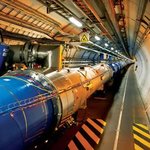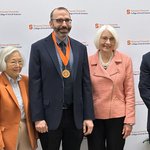Department of Physics
Satisfy your curiosity about the universe, from the largest astronomical scale to the smallest subnuclear particle. Physics will help you strengthen your quantitative reasoning skills and problem-solve through experimentation, simulation and analytical tools.
Imagine yourself exploring the galaxy, building the next quantum computer, dissecting how cells crawl, or shining light on how atoms and the world itself comes together. These exciting experiences can be found within the world of physics. Physics is concerned with the most basic principles that underlie all phenomena in the universe from sub-atomic particles to whole universes and everything in between. In Physics, you will learn about these exciting phenomena along with important skills in logic, problem solving, quantitative reasoning, and experimental design that employers in all fields are seeking. Our graduates from both our PhD and bachelor’s programs go on to work in academia, national labs, engineering industries, data science, in Silicon Valley and on Wall Street.
The Mission of the Physics Department is to create a community of physics scholars dedicated to excellent research and teaching that is welcome to all! We are thrilled to have you on the team for this important mission.
Faculty research areas include:
Events

Events
There are no events in this category right now, but please check the University calendar for many other options.
Upcoming Events
Ongoing Events
Recent Physics News

(July 2, 2025)
A&S Physicists Awarded Breakthrough PrizeA&S physicists were among international researchers awarded the 2025 Breakthrough Prize in Fundamental Physics for their work at CERN's Large Hadron Collider.

(May 20, 2025)
Working Towards Future Physics DiscoveriesAntara Paul, a graduate student in the Department of Physics, shares recent research advancements being achieved by fellow graduate students at Syracuse University.

(May 15, 2025)
Efforts to Improve Learning and Retention in Physics HonoredSTAR Award recognizes Prof. Jenny Ross’ work on local school partnerships and summer programs that create pipelines for all students into STEM fields.

(April 17, 2025)
Installation of Kathy and Stan Walters Endowed Professor of Quantum ScienceThe endowed professorship represents the latest addition to A&S’ high-caliber faculty.
